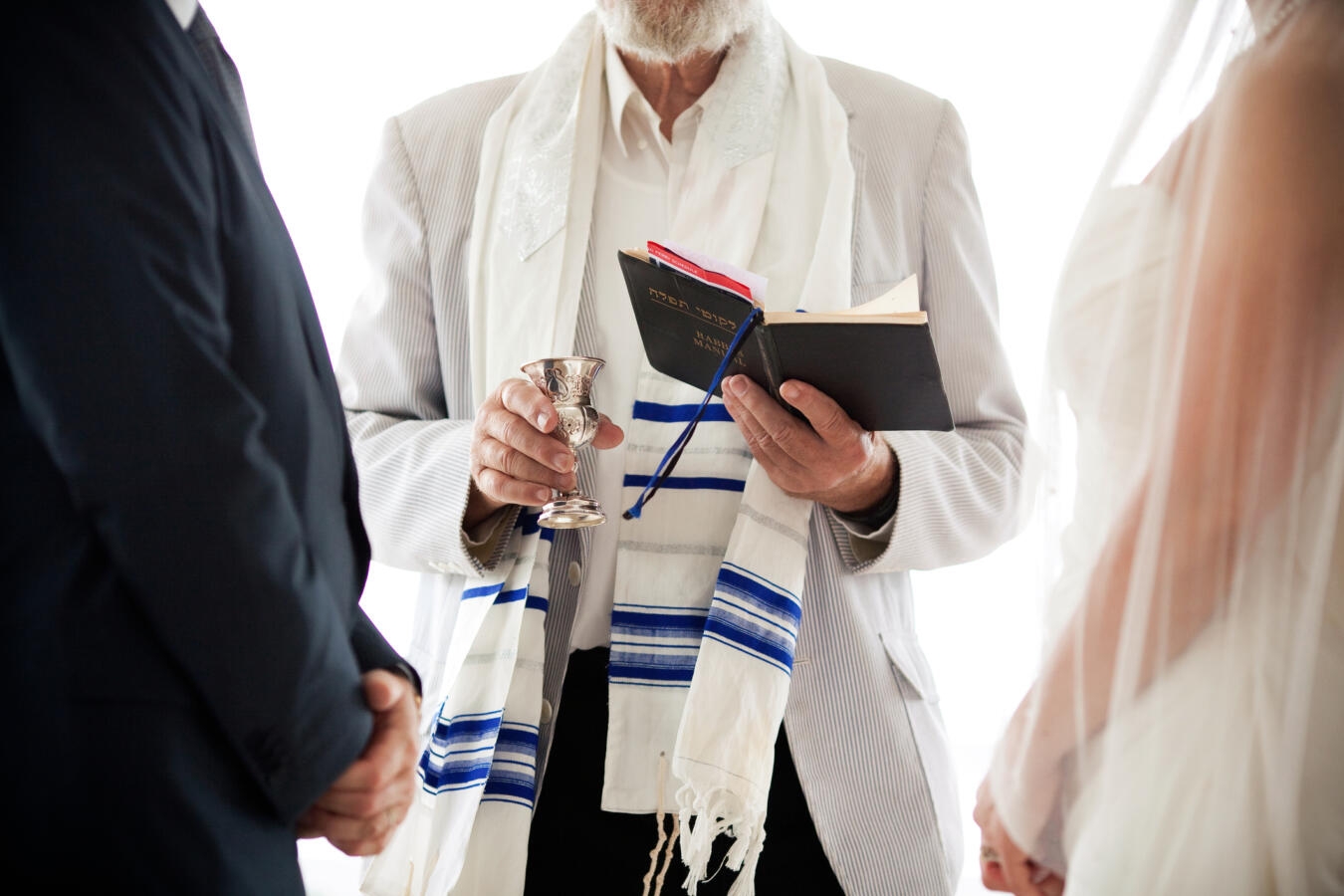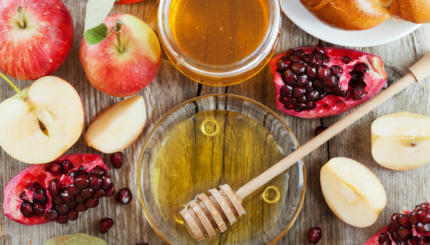Recited under the huppah (wedding canopy) and then also at the meal following the wedding as well as in the week after the wedding, the (seven blessings) are the heart of the Jewish wedding ceremony. In this article, read them in Hebrew and English, then learn when they are recited and what they mean as well as some modern variations.
Are you planning a Jewish wedding? Let us help out! Sign up for Breaking the Glass, an email series that will help guide you to the wedding that’s right for you!
The Seven Blessings in Hebrew, Transliteration and English Translation
|
א בָּרוּךְ אַתָּה יְיָ אֱלֹהֵֽינוּ מֶֽלֶךְ הָעוֹלָם בּוֹרֵא פְּרִי הַגָּֽפֶן׃
Baruch ata Adonai, Eloheinu melech ha’olam, borei p’ri hagafen.
|
1 Blessed are you, Lord our God, Ruler of the Universe, who creates the fruit of the vine.
|
|
ב בָּרוּךְ אַתָּה יְיָ אֱלֹהֵֽינוּ מֶֽלֶךְ הָעוֹלָם שֶׁהַכֹּל בָּרָא לִכְבוֹדוֹ׃ Baruch ata Adonai, Eloheinu melech ha’olam, she’hakol bara likhvodo.
|
2 Blessed are you, Lord our God, Ruler of the Universe, who created everything for His glory.
|
|
ג בָּרוּךְ אַתָּה יְיָ אֱלֹהֵֽינוּ מֶֽלֶךְ הָעוֹלָם יוֹצֵר הָאָדָם׃ Baruch ata Adonai, Eloheinu melech ha’olam, yotzer ha’adam.
|
3 Blessed are you, Lord our God, Ruler of the Universe, who created humanity.
|
|
ד בָּרוּךְ אַתָּה יְיָ אֱלֹהֵֽינוּ מֶֽלֶךְ הָעוֹלָם אֲשֶׁר יָצַר אֶת הָאָדָם בְּצַלְמוֹ בְּצֶֽלֶם דְּמוּת תַּבְנִיתוֹ וְהִתְקִין לוֹ מִמֶּֽנּוּ בִּנְיַן עֲדֵי עַד. בָּרוּךְ אַתָּה יְיָ יוֹצֵר הָאָדָם׃ Baruch ata Adonai, Eloheinu melech ha’olam, asher yatzar et ha’adam b’tzalmo b’tzelem d’mut tavnito v’hitkin lo mimenu binyan adei ad. Baruch ata Adonai, yotzer ha’adam.
|
4 Blessed are you, Lord our God, Ruler of the Universe, who created humanity in His image, in the image of the likeness of his form, and made for them an everlasting establishment. Blessed are you, Lord, who created humanity.
|
|
ה שׂוֹשׂ תָּשִׂישׂ וְתָגֵל הָעֲקָרָה בְּקִבּוּץ בָּנֶֽיהָ לְתוֹכָהּ בְּשִׂמְחָה. בָּרוּךְ אַתָּה יְיָ מְשַׂמֵּֽחַ צִיּוֹן בְּבָנֶֽיהָ׃ Sos tasis v’tagel ha’akara b’kibbutz baneha l’tocah b’simcha. Baruch ata Adonai, m’sameiach tzion b’vaneha.
|
5 May the barren one (Jerusalem) rejoice greatly and delight in the ingathering of her children within her in joy. Blessed are you Lord who causes Zion to rejoice with her children.
|
|
ֳו שַׂמֵּֽחַ תְּשַׂמַּח רֵעִים הָאֲהוּבִים כְּשַׂמֵּחֲךָ יְצִירְך בְּגַן עֵֽדֶן מִקֶּֽדֶם. בָּרוּךְ אַתָּה יְיָ מְשַׂמֵּֽחַ חָתָן וְכַלָּה׃
Sameach t’samach rei’im ha’ahuvim k’simchacha ytzircha b’gan eden mikedem. Baruch ata Adonai, m’sameach chatan v’kala.
|
6 The loving partners shall rejoice as You caused your creatures to delight in the Garden of Eden of old. Blessed are you Lord who causes the groom and bride to rejoice.
|
|
ז בָּרוּךְ אַתָּה יְיָ אֱלֹהֵֽינוּ מֶֽלֶךְ הָעוֹלָם אֲשֶׁר בָּרָא שָׂשׂוֹן וְשִׂמְחָה חָתָן וְכַלָּה. גִּילָה רִנָּה דִּיצָה וְחֶדְוָה אַהֲבָה וְאַחֲוָה וְשָׁלוֹם וְרֵעוּת. מְהֵרָה יְיָ אֱלֹהֵֽינוּ יִשָּׁמַע בְּעָרֵי יְהוּדָה וּבְחֻצוֹת יְרוּשָׁלָםִ, קוֹל שָׂשׂוֹן וְקוֹל שִׂמְחָה קוֹל חָתָן וְקוֹל כַּלָּה קוֹל מִצְהֲלוֹת חֲתָנִים מֵחֻפָּתָם וּנְעָרִים מִמִּשְׁתֵּה נְגִינָתָם. בָּרוּךְ אַתָּה יְיָ מְשַׂמֵּֽחַ חָתָן עִם הַכַּלָּה׃
Baruch ata Adonai, Eloheinu melech ha’olam, asher bara sason v’simcha chatan v’chala. Gila, rina, ditzah v’chedva, ahava v’achava v’shalom v’rei’ut. M’heira Adonai Eloheinu yishama b’arei yehuda u’vchutzot yerushalayim, kol sason v’kol simcha kol chatan v’kol kala, kol mitzhalot chatanim meichupatam u’n’arim mimishtei n’ginatam. Baruch ata Adonai m’sameiach chatan im ha’kala.
|
7 Blessed are you, Lord our God, Ruler of the Universe, who creates happiness and joy, groom and bride. Exultation, delight, amusement, and pleasure, love and brotherhood, peace and friendship. Soon, Lord our God, may the sound of happiness and the sound of joy and the voice of the groom and the voice of the bride be heard in the cities of Judah and the streets of Jerusalem — the rejoicing of groom from their huppahs and youths from their singing banquets. Blessed are you Lord who makes the groom rejoice with the bride.
|
Under the Huppah
During the ceremony, the seven blessings are traditionally chanted in Hebrew and may also be read in English. In the Sephardic tradition, a parent often wraps the bride and groom in a tallit (prayer shawl) before the recitation of the blessings, to recognize the intimacy and significance of the moment. Many contemporary couples use the theme of “blessing” to creatively interpret the reading of the Sheva Brachot: They may invite seven friends or family members to each recite one of the blessings or have the traditional blessings sung in Hebrew while friends or family members offer seven non-traditional blessings in English.
There are many English interpretations of the Sheva Brachot available, some of which use neutral or feminine God language instead of the traditional male imagery. Often couples will include the Sheva Brachot in Hebrew and/or English in their wedding programs so that guests can fully participate in this important moment in the ceremony. Traditionally, everyone present joins with the leader in singing parts of the final blessing.

Help us keep Jewish knowledge accessible to millions of people around the world.
Your donation to My Jewish Learning fuels endless journeys of Jewish discovery. With your help, My Jewish Learning can continue to provide nonstop opportunities for learning, connection and growth.
Some Alternative Versions of the Sheva Brachot
An Abbreviated Version of the Sheva Brachot
At the Wedding Reception

It is customary for the Sheva Brachot to be recited again during the wedding celebration over a glass of wine, following the Birkat Hamazon (grace after meals). In this case, the first blessing (Kiddush) is moved to the final position. This second sharing of the blessings gives couples an additional opportunity to honor their loved ones by inviting them to offer one of the blessings.
Another beautiful custom for this sharing of the Sheva Brachot is for the wine to be divided into two different cups — representing bride and groom — that are then poured together into a third cup. The wine that has been mixed together is poured back into cups for the bride and groom, and also poured into the third cup, shared by the community. This ritual shows how the couple is now connected, and how their life together is intertwined with community.
The Week After the Wedding
While today many newly married couples are eager to sneak away for honeymoon time alone (and often to de-stress from their wedding planning marathons), Jewish tradition held that the bride and groom needed time with the community to help start their marriage out on the right foot. For the seven days following the wedding, the bride and groom were treated like a queen and king, and were invited to dine at the home of a different friend or relative on each night. These festive meals were also called “Sheva Brachot.” Following dinner, the seven blessings would be recited again — as long as a minyan of 10 were present and there was at least one new person who hadn’t been at the wedding present. The idea of the dinners was to have real community celebrations for the couple, and parties often went into the night. During generations when marriages were arranged and couples may have met just before marriage the Sheva Brachot meals served as a way for the couple to get to know each other, while being supported by the community.
Today the Sheva Brachot festive meals are still an important custom, though observed more regularly in traditional circles. Some couples postpone their honeymoon trips so that they can celebrate with their community first and then celebrate their marriage together later. Other Jewish couples are choosing to engage in the custom for some of their first week of marriage or will even celebrate a week of Sheva Brachot when they return from their honeymoons.
Modern Traditions
Traditionally, only Jewish men are counted in a and only Jewish men can recite the Sheva Brachot, both under the huppah and during the festive meals following the wedding. In liberal Jewish communities, both men and women are welcomed and encouraged to recite the Sheva Brachot. Some Orthodox feminists have challenged the halakhah (Jewish law) surrounding this debate, but have largely not made ground in changing this tradition. Other Orthodox and some Conservative women, though, in a desire not to challenge the halakhah but to still include women friends and family members in their wedding honors have created a new tradition: the Sheva Shevahot, or seven praises. These seven praises are recited before, rather than after, the wedding meal, and emphasize the psalms and poems which celebrate the accomplishments of biblical women. The seventh praise is often the Shehechiyanu blessing.
Rabbi Dov Linzer, a Modern Orthodox rabbi, has written largely about another halakhic compromise: calling both men and women up to the huppah in pairs for a Sheva Brachot honor, with the man reciting the blessing in Hebrew and the woman reading an English translation. Rabbi Linzer also notes that in terms of halakhah, the reciting of the Sheva Brachot after the meal at the wedding celebration is the obligation of the community, rather than the groom himself, and so since women are part of the community, they may participate in sharing those honors in Hebrew.
Are you planning a Jewish wedding? Let us help out! Sign up for Breaking the Glass, an email series that will help guide you to the wedding that’s right for you!
Adonai
Pronounced: ah-doe-NYE, Origin: Hebrew, a name for God.
chuppah
Pronounced: KHOOP-uh or khoo-PAH, Origin: Hebrew, canopy under which a Jewish wedding ceremony takes place.
halacha
Pronounced: hah-lah-KHAH or huh-LUKH-uh, Origin: Hebrew, Jewish law.
Shehechiyanu
Pronounced: sheh-hekh-ee-YAH-new, Origin: Hebrew, a blessing said upon experiencing a new or special occasion.
halachic
Pronounced: huh-LAKH-ic, Origin: Hebrew, according to Jewish law, complying with Jewish law.



